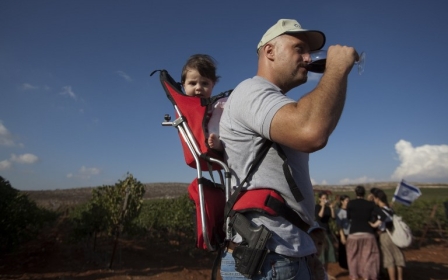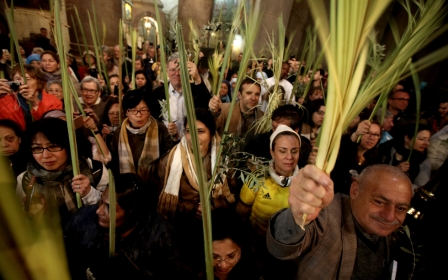Volunterrorism in Israel?

On a trip to Amsterdam a few years ago, my mother had the misfortune to encounter another American tourist, of 70-some years of age, who was apparently not content to sit back and enjoy her holiday and instead insisted on trying to recruit people to volunteer on Israeli army bases.
Having recently taken part in a programme organised by the American outfit Volunteers for Israel (VFI), the woman swore it was the opportunity of a lifetime: free room and board, a worthy cause - and you didn’t even have to be Jewish!
My mother chased her off but kept the slip of paper on which the woman had written the VFI website as well as that of its Israeli partner Sar-El, the National Project for Volunteers for Israel, which places international volunteers on bases and oversees their activities.
VFI advertises itself as a “nonprofit, non-political, non-sectarian organisation” - although it’s a bit difficult to think of anything more political and sectarian than material support for a Zionist military dedicated to ethnic cleansing and frequent massacres of civilians.
The website explains that the program started in 1982 “during the first war with Lebanon, when Israeli farmers in the [occupied] Golan Heights faced the prospect of losing their crops".
The cause of the agricultural predicament: “Most able-bodied men and women were called up for army reserve.” The solution: bring in volunteers from the US to “harvest crops and save the economy". The result: “More than 600 volunteers responded immediately, and the crops were saved.”
Plus, the experience was “so personally rewarding and successful” that it spawned a whole volunteer enterprise. The Sar-El website notes that as of 2010 the project had “brought in over 132,000 volunteers".
Meanwhile, the Golan crops may have been saved, but the same couldn’t be said for some 20,000 victims of Israel’s invasion of Lebanon, the great majority of them civilians. It bears mentioning, too, that this was not in fact the “first war” on that country - the able-bodied men and women of the Israeli armed forces having performed a similar routine four years earlier, albeit with a lower casualty count.
According to VFI, “The Best Thing You Can Give Israel Is … Yourself.” But if you can’t swing that, the website suggests plenty of other ways to pitch in: include VFI in your will, donate via AmazonSmile, or plant trees in Israel. In case any of you cheapskates were considering planting half a tree, the “minimum quantity allowed is one".
For those who have the money to cover airfare to Israel plus the $100 VFI application fee, there are programmes from one to three weeks in length offered for three different categories: Young Adults ages 17-25, Adults, and Groups. Participants in the separate Taglit-Birthright programme have the option to extend their bonding session with the newfound homeland by tacking on a tour of volunteer duty.
The description of the programme for adults comes with a photo of ecstatic older folks in green uniform and this enticing note: “You will work alongside soldiers, [military] base employees and other volunteers … performing non-combat civilian support duties such as packing medical supplies; repairing machinery and equipment; building fortifications; and cleaning, painting, and maintaining the base.”
There is no upper age limit for participation, but there are some other important restrictions. The lengthy application form specifies that persons with “active HIV or AIDS” will be excluded from consideration, as will persons with sleep apnea that “causes loud snoring, gasping, or choking which may interfere with the sleep of other volunteers in a multiple bunk room, and/or will put volunteers in danger during the work day e.g. daytime fatigue.”
If only Palestinians experienced such concern over the quality of their sleep, as opposed to night- and day-time bombing raids and home demolitions by the Israeli army.
Which brings us to the question: why is it that one of the most powerful militaries in the world, the fighting force of a state that receives billions of dollars annually from the global superpower, requires volunteer assistance in the first place?
As the Sar-El website boasts, the volunteer programme entails numerous benefits: it promotes Jewish immigration to Israel; “fosters new friendships”; “contributes to Israel’s economy”; and “creates ambassadors of goodwill for Israel".
In short, volunteers are meant to forge a physical and emotional bond with Israel and its soldiers, and then go tell the world about it. Case in point: the pest in Amsterdam, or the Florida college student who wrote for the Huffington Post about his “eye-opening and breathtaking experience” volunteering with the Israeli military, which, he assured his audience in the second sentence, was not “a story of politics".
A long-time strategy of Israeli hasbara, or propaganda, has, of course, been to replace serious political issues with innocuous and superficial ones. Back in 2010, I happened upon a (now-defunct) website, courtesy of the Israeli Ministry of Public Diplomacy and Diaspora Affairs, which advised anyone who wanted to be an honorary “novice ambassador” for Israel on how to go about combating “barbs of criticism” directed at the Jewish state.
The stated aim of the website was to “make it possible for each one of us to arm ourselves with information and pride in Israel’s global contributions and history and to present a more realistic image of Israel to the world".
Numerous contributions were listed on the site, including intriguing factoids like: “An Israeli invention for an electric hair removal device makes women happy all over the world.”
The Palestinians, alas, have failed to make any such lasting impact on global culture, and any novice ambassador for Palestine would instead be condemned to memorising things like how many children have been murdered by the Israeli army.
Among other relevant factoids, meanwhile, is that the United States happens to define terrorism as comprising activities that “appear to be intended to intimidate or coerce a civilian population". As there’s no getting around the fact that this is one of the Israeli military’s primary functions, perhaps anyone wishing to lend a hand should henceforth be assigned the role of “volunterrorist".
- Belen Fernandez is the author of The Imperial Messenger: Thomas Friedman at Work, published by Verso. She is a contributing editor at Jacobin magazine.
The views expressed in this article belong to the author and do not necessarily reflect the editorial policy of Middle East Eye.
Photo: Israeli youths crawl in the sand as they take part in a training session for the Israeli Elite Army Units in the city of Herzliya, near Tel Aviv, on 19 February, 2016 (AFP).
Middle East Eye propose une couverture et une analyse indépendantes et incomparables du Moyen-Orient, de l’Afrique du Nord et d’autres régions du monde. Pour en savoir plus sur la reprise de ce contenu et les frais qui s’appliquent, veuillez remplir ce formulaire [en anglais]. Pour en savoir plus sur MEE, cliquez ici [en anglais].





